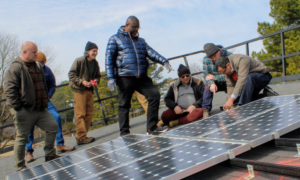Solar Training Bootcamp will prepare young professionals in Southeastern NC for clean energy careers
NCCETC has partnered with North Carolina State University’s (NCSU) College of Natural Resources (CNR) to develop a “Solar Training Bootcamp” aimed to prepare high school graduates and current higher education students for future careers in renewable energy. The five-year program is funded by the Department of Labor (DOL) and is titled Building Sustainable Pathways to Improve Underserved and Underrepresented Worker Access for Renewable Energy Infrastructure in Rural, Southeastern North Carolina.
The training will serve individuals who are based in southeastern North Carolina, in which there is high potential for solar renewable energy growth and infrastructure development. The targeted region encompasses 12 counties that are predominantly rural and have a lower socioeconomic status compared to other areas in North Carolina. The demand for experienced clean energy professionals like electrical engineering technicians, solar energy installation managers, and environmental specialists is expected to grow exponentially over the next few years. This program will place students on a direct path to a career in the renewable energy industry. Training Program Manager at NCCETC, Allison Carr, adds “our ultimate goal is to connect students with internships, apprenticeships, or full-time jobs in the solar industry. We know there are many types of educational pathways to jobs. We will support students by matching their interests and skills with the training and mentorship needed to start a great career.”
 Trainees will participate in an intensive five day training program based on the Center’s Fundamentals of Solar PV Installation and Design (FSPV) course, which allows students to gain knowledge in renewable energy technologies. Participants will also engage with industry professionals to develop essential workplace skills that will prepare them for a career in the industry. After completing this course, participants will have the option to continue their education through NCSU’s online Renewable Energy Assessment Undergraduate Certificate program, sit for the NABCEP PV Associate Exam, and attend NCCETC’s Renewable Energy Technologies Diploma Series.
Trainees will participate in an intensive five day training program based on the Center’s Fundamentals of Solar PV Installation and Design (FSPV) course, which allows students to gain knowledge in renewable energy technologies. Participants will also engage with industry professionals to develop essential workplace skills that will prepare them for a career in the industry. After completing this course, participants will have the option to continue their education through NCSU’s online Renewable Energy Assessment Undergraduate Certificate program, sit for the NABCEP PV Associate Exam, and attend NCCETC’s Renewable Energy Technologies Diploma Series.
This program will bring in mentors from Historically Black Colleges and Universities (HBCUs), Native American-Serving Nontribal Institutions (NASNTIs), Hispanic Serving Institutions (HSIs), and professionals from minority-owned renewable energy companies. The Mentor Cohort will support the trainees by providing professional soft-skill development, communicating technical skill needs and employment opportunities, and sharing career pathway advice. The combination of training and mentorship is intended to build a sustainable career pathway system to mid-tier and upper-tier renewable energy jobs for women and minorities currently underrepresented in the clean energy industry.
In the first year of the program, the Mentor Cohort will participate in training at NCCETC, and in the following year, the first trainee group will also attend at the Center. In years three through five of the program, the training is anticipated to be held at Sampson Community College and UNC Pembroke, two institutions that serve the Southeast region of North Carolina. Participants who complete the bootcamp will be supported by their Mentor Cohort in obtaining internships, additional certificates, or degree programs.

The Friday Institute at NC State University will be evaluating the program and assessing the project training, mentorship, internships, and post-project employment opportunities.
NCCETC and CNR are currently recruiting professionals that are interested in being part of the Mentor Cohort. Potential employers in the clean energy industry are also encouraged to provide insight on what they are looking for in an intern or employee, to ensure the training meets the desired outcomes. Please reach out to Training Program Manager Allison Carr at akcarr@ncsu.edu if you are interested in participating as a student or a mentor, or if you would like to provide feedback on best practices for preparing career-ready clean energy professionals.